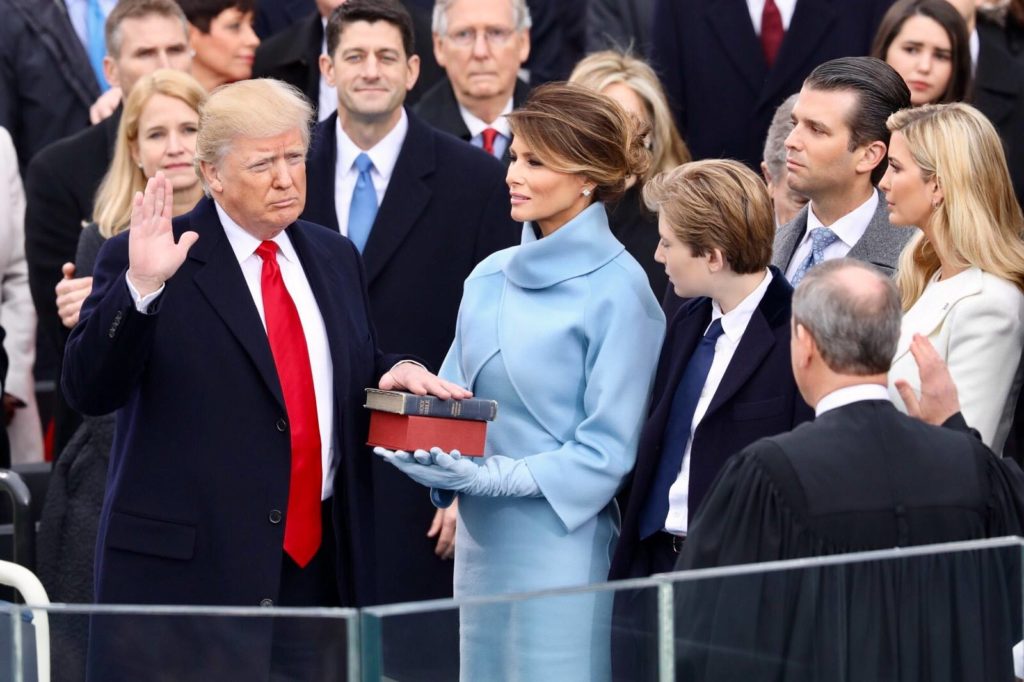FRESH AIR
UPDATES
How the Middle East has reacted to Trump
January 27, 2017 | Shmuel Levin

Shmuel Levin
President Trump’s first days in office have been met with a wide range of responses from Israel and the broader Middle East.
On January 21, Israeli Prime Minister Netanyahu took to Twitter to congratulate President Trump:
Congrats to my friend President Trump. Look fwd to working closely with you to make the alliance between Israel&USA stronger than ever
Speaking at a Likud caucus meeting, Netanyahu described the “very warm” telephone conversation he had with Trump (Link: Video (Heb) and Transcript (Heb)):
“President Trump believes that peace can be achieved only by way of direct negotiations – does that sound familiar?
He spoke of his unprecedented commitment to Israel’s security and the war on radical Islamic terrorism. Does that too sound familiar?”
[Trump] “spoke with me at length about the threat presented by Iran. Trump also thinks that the nuclear deal with Iran is a bad deal. That also certainly sounds familiar.
And, of course, we spoke of other topics too, in a conversation that lasted about half an hour.”
Referring directly to the change in Administration, Netanyahu noted:
“I feel the expectation of many Israeli citizens. It is, of course, understandable. After eight years during which I withstood immense pressure on a number of issues, first and foremost Iran and the settlement enterprise, I certainly welcome the change in approach.”
Across the political spectrum, centre-left Opposition MK Tzipi Livni stated at the annual INSS conference: “I’m going to surprise you, because I also see an opportunity, even a big opportunity” with the Trump Administration. Livni argued that the leeway provided by the Trump Administration means that the Israeli Government can no longer argue to its right wing constituency that it acts under coercion from Washington, and it will therefore be forced to lay down its own positions.
Further to the right, Education Minister Naftali Bennett called on Netanyahu to take advantage of a “new diplomatic era”. Similarly, Justice Minister Ayelet Shaked argued that “the rules of the game have changed and you can’t play according to the old rules… there is no reason why we can’t take unilateral steps that will be right for Israel.”
According to the Jerusalem Post, a growing number of Israeli politicians are expected to descend on Washington in the coming weeks to develop ties with the new Administration. Defence Minister Avigdor Liberman and Public Security Minister Gilad Erdan are also said to be considering a visit to Washington in coming weeks.
Most notably, Netanyahu himself was invited to Washington during the telephone call. Netanyahu is likely to visit in the first week of February, before traveling to Singapore and Australia later in the month. Additionally, President Reuven Rivlin and Labor Party chairman Isaac Herzog are also likely to visit Washington in March for AIPAC’s annual Policy Conference.
Israeli press reactions
While generally acknowledging that the new Administration is likely to herald significant changes for Israel, reactions in Israel’s press have varied across the political spectrum.
In response to a question from the right-leaning Israel Hayom, the White House sent an exclusive reply “stressing the new administration’s intention to ‘rehabilitate the special relationship’ between Washington and Jerusalem, based on ‘shared interests and common values,’ to make it as strong as it was in the past.” Similarly, recent opinion pieces in Israel Hayom have called for Israel to “stand with [Trump] in this war” against “radical Islam”.
By contrast, the left-wing Haaretz editorialised against the Netanyahu government’s approval of construction in east Jerusalem immediately following the inauguration “with Trump behind him and a silent opposition”. Similarly, other opinion pieces in Haaretz queried “how do you resist Trump in Israel?” and championed Trump’s apparent walking back of his Jerusalem embassy promise.
Elsewhere, the Jerusalem Post cautioned against actions which might strain the relationship, and praised Netanyahu for shelving a bill that would officially annex Ma’aleh Adumim until after his meeting with Trump.
The wider Middle East response
Across the Middle East, many Gulf officials appear cautiously optimistic at the arrival of President Trump. In particular, Gulf countries are hoping for a renewed check against a resurgent Iran that has been strengthened under Obama’s presidency. However, both the official and press response has largely been muted and stressed the need to “wait and see”.
By contrast, Iran’s President Rouhani has stated that the election results will “have no effect on Tehran’s policies” and has warned that no one government can dissolve the UN Security Council-backed resolution lifting sanctions. In Iran, the inauguration was not broadcast live on national television, and the Iranian news bulletin only stated that “the new US president had begun his work amid popular protests”.
In Egypt, President Abdel Fattah el-Sisi said in a statement that:
“The President looks forward to strengthening the friendship and enhancing the special strategic relations that bind Egypt and the United States of American at all levels”.
And that:
“Egypt looks forward to a new momentum in the trajectory of Egyptian-American relations under the administration of President Trump that shall serve the shared benefit and interest of the Egyptian and American peoples.”
The statement followed a call of congratulations from el-Sisi to Trump, in what Egypt claims was the first call of congratulations the President received. The Egyptian Embassy in Washington has also posted pictures on social media of a meeting between US and Egyptian officials, in what it described as “a new phase of strategic partnership between Egypt and the Unites States of America”.
In Egypt’s social media circles, some users have expressed pride in el-Sisi, whilst others questioned Trump’s intentions. In Egypt’s traditional media, similarities were drawn between Trump and el-Sisi, both of whom display a tough stance on terror and have often criticised the media for “misleading the people.”
Tags: Egypt
RELATED ARTICLES

He survived Bondi. Now he’s fighting back: Arsen Ostrovsky addresses AIPAC conference

US Middle East strategy amid regional instability: Dana Stroul at the Sydney Institute





















